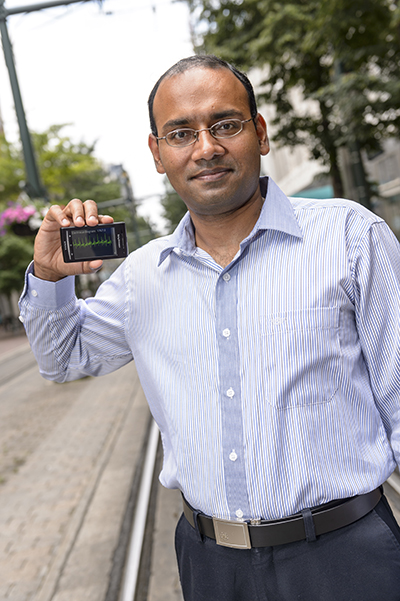mediaroom
House Call
Dr. Santosh Kumar - one of the world's leading experts in mobile health - was chosen to lead prestigious NIH Center of Excellence.
 To old-school University of Memphis alumni, mobile health might bring to mind a medical
clinic on wheels — usually a bus. But for UofM computer science professor Santosh
Kumar, it involves monitoring major diseases and behavioral addictions with something
that easily slips into a pocket: a smartphone.
To old-school University of Memphis alumni, mobile health might bring to mind a medical
clinic on wheels — usually a bus. But for UofM computer science professor Santosh
Kumar, it involves monitoring major diseases and behavioral addictions with something
that easily slips into a pocket: a smartphone.
Dr. Kumar is developing wearable sensors and software that transform a person's smartphone into a data-gathering device that sheds light on behaviors and environments to improve health care and health care strategies. Stress and congestive heart failure — Kumar's system can monitor those. Smoking, drug addiction and alcohol use, those, too.
The data collected by the smartphone will help scientists intervene and prevent chronic behaviors by being a sort of Johnny-on-the-spot. The phone tells researchers if a person with an alcohol problem has been in a bar, and if so, for how long. It picks up stress indicators and can gather data about how the heart is performing, if the lungs are gathering fluid and other disease indicators, possibly warding off major health issues. It holds the promise of better treatment plans and possibly cheaper insurance rates.
"Why would a person not want to wear something that is light and compact and does the same things that a heavy heart monitor would do?" says UofM alumnus Dianne Moody (BBA '10), who said family members with heart conditions have had to wear heavy probes and other cumbersome equipment while being monitored. "It is convenient and it is cost saving."
Kumar's research has made him one of the world's leading experts in the exploding field of mobile health (mHealth). It was a major factor in the UofM being awarded a National Institutes of Health Center of Excellence — the Mobile Sensor Data-To-Knowledge Center (MD2K) — that University of Memphis President M. David Rudd says "will create a culture of research excellence that is essential for our research future."
Memphis is the lead university for the $10.8 million Center. It includes top scientists from 11 universities: Cornell, Georgia Tech, Michigan, University of Texas's M.D. Anderson Cancer Center, Northwestern, Ohio State, UCLA, UC-San Diego, UC-San Francisco, University of Massachusetts and the UofM.
"It establishes our credibility in terms of our capacity to manage a major funding effort with national prominent partners," says Rudd. "Dr. Kumar and his work in mobile health was the major reason we were awarded the Center. The spin-off grant activity this will create will be enormous."
In February, Kumar and fellow MD2K team member Dr. Kevin Patrick from UC-San Diego were a part of a small group of scientists invited to Washington, D.C., to participate in an NIH-sponsored workshop to present their recommendations on incorporating mobile technologies in President Obama's Precision Medicine Initiative.
